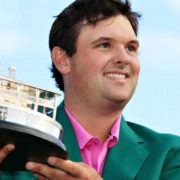Make it two majors in two years for rising Korean star Sung Hyun Park
KILDEER, Ill. — Sunday’s story lines were swirling like the winds in suburban Chicago for the final round of the KPMG Women’s PGA Championship.
But when the day finally ended after a two-hole playoff and a brief storm delay, Sung Hyun Park was the winner. The victory brought the normally steely South Korean to tears on the shoulder of her caddie, David Jones.
It was Park’s second major championship in two years, and it came after she held off compatriot So Yeon Ryu and Japan’s Nasa Hataoka in a playoff following her bogey-free round of 3-under 69. For the week, Park carded rounds of 66-72-71-69 for a finish at 10-under 278.
“Actually, this is my first time feeling this kind of emotion,” Park said when asked about her tears after the round. “I couldn’t help that.”
It was understandable.
After winning last year’s U.S. Women’s Open as a rookie, Park won the CP Women’s Open in Canada and wrapped up 2017 as the LPGA’s top rookie and co-player of the year. But 2018 hasn’t looked like 2017.
Although she won the LPGA event in Texas in May and tied for ninth in March at the ANA Inspiration, she has missed five cuts, including in the U.S. Women’s Open. That’s when the doubters got in her ear.
“The tears came today because she understood how hard it was to win this week,” Jones said. “We’ve missed four of the last six cuts, so she’s felt the pressure. She also had to battle herself to win this one.”
Park started Sunday’s final round trailing Ryu, who built a 3-shot lead surging past Canadian Brooke Henderson and Park on Saturday. Brimming with confidence, Park appeared one round closer to adding another major championship to her collection as she gained momentum Sunday afternoon.
But it was Hataoka who blistered Kemper Lakes Golf Club on Sunday with a round of 8-under 64 to storm from behind and move within one shot of Ryu, who had six holes to play when Hataoka signed her scorecard.
Hataoka recorded two eagles in her round and put a number on the leaderboard that likely got the attention of Park and Ryu.
Hataoka chipped in from a back bunker on No. 7 and added a second eagle on No. 11. The 19-year-old also rolled in birdie putts on holes 12, 15 and 16, saved par from a greenside bunker on No. 17 and again saved par from the back fringe on the last hole.
With a sparkling 64 in her pocket and a chance to win, Hataoka turned and bowed to the Kemper Lakes course out of respect and then headed to the clubhouse to wait an hour for Park and Ryu to complete their rounds.
Meanwhile, out on the course, Park flirted with disaster on the challenging par-4 16th hole. Trying to carry the water hazard on her approach shot into the green, her ball hit the lake bank and bounced back into some tall grass by the water’s edge. Neither she nor Jones could see the ball, but it was a tense walk toward the errant shot.
“I thought the tournament was gone,” Jones said. “I thought the ball was in the water, but when I reached it and saw that it was still above ground, I nearly broke my neck turning around to tell her it was playable.”
Park’s ball landed on a big tuft of grass. It wasn’t clear where the water ended, but Park and Jones discussed how to extract the ball from the pond’s edge, and Park opted to use her 58-degree wedge and play it like a bunker shot.
The ball landed two feet from the hole, and Park converted the putt to save par on what could have just as easily ended her hope to win.
“Actually, that was my first time doing that kind of shot,” Park said.
It was the par-3 17th hole that caught up with Ryu. With a 2-shot lead, her tee shot sailed left of the green into the water hazard. She finished the hole with a double-bogey 5, dropping her into a three-way tie at 10 under with Park and Hataoka.
That misstep was Ryu’s second double-bogey of the day. She took a double-bogey 6 on the second hole but rallied back with birdies on holes 6 and 7. The double on No. 17 forced Ryu to refocus — and quickly, as she was running out of holes.
“I had to let it go,” she said. “I don’t think the [yardage] number was bad, but I just drew it a little too much.”
Park and Ryu matched pars on the 18th to move into a playoff with Hataoka, who watched the telecast from the clubhouse before heading out to prepare.
The three players returned to the 18th hole for the sudden-death playoff. Ryu drained a 16-foot birdie putt to put the pressure on her two fellow competitors.
Putting from the back fringe, Hataoka’s 15-foot birdie effort missed right, and she was eliminated. Last to putt, Park drained an 8-foot downhill putt to stay in the playoff.
“I did feel nerves going [into the playoff], but on the other hand, I haven’t won a major yet, so I felt like I had nothing to lose,” Hataoka said. “When So Yeon made her putt … hats off to her.”
The matched birdies on the first playoff hole sent Park and Ryu to No. 16 to continue their duel. Both players were preparing to putt when thunder rumbled in the distance.
Play was suspended due to lightning. Heavy rain followed, but the storm blew through quickly, and play resumed with the players on the green just 20 minutes later.
Park slammed home a 7-foot birdie putt to win, as Ryu’s birdie effort rolled past the left edge of the cup.
“It was a really long round today, and I still can’t believe that I’m sitting next to this trophy,” said Park, 24, who has four career wins and career earnings of more than $3.1 million in less than two seasons on the LPGA Tour.
Park is still trying to learn to speak English. The success she has experienced in a short amount of time has come faster than her ability to articulate her thoughts. The American media sometimes struggle to connect with the Korean star. On the other hand, the Korean media often expect more than she can deliver.
“She’s still just piecing it all together,” Jones said of Park. “There’s an awful lot expected of her back home in South Korea. After she came out of nowhere last year to win the U.S. Women’s Open, I think the expectation was that she should be winning every week. In golf, for every one you win, there will be many more that you never even sniff.”
But this week, once again, Park sniffed victory.
She had to fight for it. Against herself. Against blazing temperatures and stormy weather. Against a playoff and with a memorable shot beside a pond that was reminiscent of fellow South Korean Se Ri Pak’s storied shot from the water to force a playoff in 1998 to win the U.S. Women’s Open.
It might be only the beginning of Park’s LPGA career, but already, the legend has begun.



